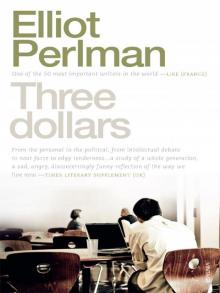- Home
- Elliot Perlman
Seven Types of Ambiguity Page 8
Seven Types of Ambiguity Read online
Page 8
Sam is warm. He is still sleeping. Usually he’s awake before me, on the weekends anyway. I finish my tea before Anna. Neither of them has ever been cold in the place where they sleep. There are many coats and many places to hang those coats in this house. And I always come home. So why does she have such trouble looking at me? Maybe it’s because I always come home. What day, what time, did I become so hateful, so contemptible? Is it familiarity that bred her contempt, and how precisely did she go from sublime excitement to comfort to boredom to contempt to the arms of some other man? And how do you get from there to a suburban police station to collect your son after he has been stolen by a man she first met a long time ago, a time before I was able to afford new carpet for my mother’s house?
She will have to look at me. She might even want to and, if she does, will I be able to look at her? I have never considered what I’ve done to come under the rubric of “infidelity.” But seeing an old boyfriend, the last one before me, that is infidelity, and over a protracted period. It has to have been over a protracted period because otherwise how would he know such intimate details about us, about Sam? How would he know where Sam went to school? How does he know Angelique? How do I know her? Am I going to have to explain all of this to Anna?
I watch her sipping her tea. How can someone so beautiful—I can still see her that way—have made me feel so unworthy? Are we going to have to tell each other the whole truth, starting from the time things here just shut down? Everything in our bedroom is white. Even Anna’s night wear. She could have finished her tea by now if she’d wanted to. It’s deliberate, this slow drinking of her tea. If she could just admit that, just start with that. Imagine if I told the truth. Where would I start?
3. I met Angelique through Dennis Mitchell. That’s not true. I met her with Mitch. Sid Graeme sent us there one Christmas as a sort of pat on the back, a sort of bonus, a gift. Well, actually, he didn’t send me there. He told Mitch that there was credit waiting there for him and some of his colleagues or his friends. Mitch and I work together more and more. We might even be friends. I like him. I think he likes me. Mitch is quiet, especially compared to most of the dealers, but he’s probably the best or certainly one of the best analysts in the research department. Unlike a number of the other analysts, he seems to have no interest in ever becoming a dealer, at least none that he’s ever talked about with me. I think he would tell me.
I’m a good dealer. A good dealer is someone who consistently provides his clients with good information. Mitch has been responsible for much of the information I give my clients. He is, in a sense, responsible for much of this house, for the cars downstairs, my bathrobe over there, for the white silk around Anna now. I once suggested to him that we were each other’s alter egos. He smiled. I’d say we were friends.
Mitch is a quiet achiever. Even compared to the other analysts, who are all quieter than the dealers, he’s quiet. But the management committee knows he’s good. Gorman himself told me this privately one Friday night at drinks and he’s the M.D. Mitch doesn’t need Gorman. He could get a job with any brokerage house in the country. The firm needs Mitch, or analysts like him. He’s got the instincts and the contacts. I need him. We’re a team, unofficially. Officially, there are no teams, just analysts and dealers, the demigods in corporate finance and the management committee. But I know Mitch gives me his best stuff, or, at least, he gives it to me first. He’s never said anything, but I think it’s because we’re just about the only Catholics in the firm. I never felt so Catholic before I started working there. The other guys all went to school with one another, all to the same handful of schools, the ones their fathers went to, the ones their sons attend, the ones where they all learn to hate Catholics.
Mitch is about my age. I think he was married but is now divorced or something, maybe even a widower. I don’t ask. I haven’t asked. He doesn’t normally stay back late for drinks on Friday nights, something only someone with Mitch’s track record could get away with in a firm like ours. But this one Friday night he seemed to be putting it away with the best of them. I don’t know, maybe it was on account of the festive season. He’d been having a great year and, perhaps because he so rarely stays back on Friday nights, a lot of people, including Gorman and some of the other guys on the management committee, were coming up to him and complimenting him. Some of the dealers appeared to be sucking up to him. I don’t know whether it was the alcohol or the praise that so took him out of himself, but when I brought him back a beer and we found ourselves alone for the first time that evening he told me about Sid Graeme’s Christmas present.
He asked me what I was doing later that night. For a split second I honestly thought he was propositioning me. That sounds ridiculous now, but at the time it didn’t seem so much more out of character than inviting me to accompany him to a brothel. That night was the first time we went there together and the first time I had ever been to a brothel at all. It wasn’t long before I no longer needed Mitch to come along for the ride.
It is difficult to imagine two people more different than Sid Graeme and Mitch. That they managed to find each other is a tribute to the market. Sid Graeme was one of the few entrepreneurs who managed to come out of the eighties with greater credibility than he took into them. It helped that he wasn’t yet that well known and that he wasn’t yet that big. But it was more than this. He had a dual strategy that was very clever. First, he had managed to get himself on all sorts of boards, commissions, and advisory panels, in the arts, in various sports, in entertainment, in hospitality, transportation—including aviation—and, perhaps most important, in government. Over the course of approximately ten years he became almost ubiquitous. Not only did he come to know everyone at the top end of town, but they all came to know him.
He was also among the first to hear of even the slightest change to the most trivial regulation, whether it was in banking, pension funds, insurance, the Stock Exchange, the corporations law, consumer protection, or any aspect of government, including the auditing of government expenditures. A man like this didn’t have to pay for his own dry cleaning. People were fighting one another to have that opportunity. This included politicians. It was invaluable to Mitch to be taken into this man’s confidence.
Secondly, Sid Graeme realized, after the crash of ’87 but before NASDAQ and the overnight rise and fall of the dot-com aristocracy of the “new” economy, that there was still a way to make a few bucks out of the “old” economy. If you were confident that your sources in government were good enough, you could invest in a forthcoming window of opportunity before the house containing it was even built. All you needed was capital and some reliable information. Sid Graeme had plenty of both.
On the strength of his borrowings he became a major shareholder in a number of private hospitals. Sticking with health care, he subsequently bought into a health-insurance company, what the Americans call a health maintenance organization, or HMO. In a cab on the way to the brothel that Christmas, Mitch filled me in on Sid Graeme’s rise to eminence in the industry.
“Impressive. But what does Sid Graeme really know about health care?” I asked, not entirely innocently.
“He’s a majority shareholder in a couple of hospitals. He’s frequently consulted by both the state and federal governments,” Mitch answered.
“Yeah, but what does he actually know about hospitals and health care?”
“He knows how to make money out of them.”
Mitch was nervous, not because of my questioning but because of where we were going. He obviously hadn’t had as much to drink as he needed, or else the reality of reading the address of the place to the cabdriver from a scrap of paper he pulled out of his coat pocket had had a sobering effect on him. I was nervous too, but I didn’t want Mitch to know and I didn’t want him to lose his nerve. Talking about Sid Graeme seemed the best way to take his mind off the journey. I pretended to be as interested as I would have been had I not been drinking too much, had I not been nervous, a little guilt
y, and, I suppose, excited.
“So does he make much money out of it?” I asked him.
“Sid Graeme?”
“Yeah.”
“Well, for a start, as CEO of the health insurance company he earns around three million.”
“Three million? You’re kidding?”
“No, I’m serious. That’s what he tells me. That’s for starters.”
“And why is he telling you all of this?” I asked him.
Mitch smiled. “I strongly suspect he might want the firm to underwrite a share issue one day.”
“By which of his companies?”
“Joe, does it matter?” He started to laugh.
Then we laughed. How we laughed. We were scared. We paid the cabdriver and walked into the foyer of the place as if we’d been there a thousand times, still laughing. I’d never seen Mitch laugh like that as we stood on all that red carpeting in the foyer and a glamorous, slightly older woman stood behind a marble counter and addressed us with a broad smile, as though she were in on whatever it was that Mitch and I were laughing about. I suddenly felt really thirsty. “Good evening, gentlemen,” she said. And we were scared.
I’m afraid now, but this was different. The woman asked our names. I didn’t want to tell her, so I laughed and she laughed and Mitch laughed. Without thinking, I told her my name was Mitch and that my friend’s name was Joe. Then Mitch and I laughed again. Whoever would have thought I’d be so scared?
“We’re guests of Mr. Graeme,” Mitch told her.
“Mr. Graeme?”
“Er . . . Sid Graeme,” Mitch said a little hesitantly. He didn’t have much bravado to exhaust.
“Oh, yes,” the glamorous, slightly older woman said, now smiling in a welcoming, reassured way before asking in a let’s-get-down-to-business manner, “Have you been here before?”
I felt like I was fifteen and I didn’t know why. It was good and it was bad having Mitch there. It was bad because he’d obviously never been there or anywhere like it before. He looked nervous, and when you’re a fifteen-year-old cock of the walk you don’t want to be with someone who smells nervous. It was good because I wasn’t alone. There were two of us to look at, two of us to distract her from each other, and from the juvenility of the pretense that the hasty, breathy, impetuous, entirely self-indulgent marriage of sex and commerce was an acceptable semi-regular option for an intelligent, hard-working, white-collar father and husband. It was reasonable for me to be there. I could reason it. I could fathom it. I could understand it. I still understand it. Anna never will.
She’ll drink stone-cold tea before she understands it. No one has ever taken such small sips. She will have constructed a perfectly blameless version of whatever it is she has been doing with the sick man who stole my son last night. She always manages to be right by the end of any strict logical analysis of the sounds that make up the words that we leave hanging in the air.
The room we were ushered into continued the foyer’s theme of very red carpeting from one gold-wallpapered wall to another, with mirrors behind a bar at one end and a pool table at the other. And it was full of women. It was overpopulated by women. Most of the people at the bar, in chairs, on couches watching television, playing pool, or just walking around were women. At first I couldn’t look anyone in the eye. I was afraid of being seen by someone I knew. It seemed there were lots of reasons to be ashamed and they all came flooding out, slippery, hard to hold on to. The machismo reasoning of my schoolyard football-playing adolescence held that there was something wrong with you if you had to pay for it. In my late teens and early twenties financial prudence dictated one was better off with a magazine, some Vaseline, and a box of tissues. Better to keep your “ready” for something tangible. But by the time I walked in with Mitch I was making good money, better than I had ever dreamed I would, and these women were certainly tangible. Anyway, this was a free introductory offer.
Their business was lust and its satisfaction. They were soft and curvaceous in the places where decades of magazines, billboards, movies, music videos, and the fashion industry said they should be. It was impossible to leave your home without being told a thousand times that this was what women should look like, that this is what we want and, one way or another, if you have money, you can have it. You need never be thirsty again.
We sat down and, in ones and twos, they gradually came up to us. Some were dressed more revealingly than others but none more than was necessary to stimulate your imagination. A tallish young woman came up alone and sat beside us.
“Hi, boys,” she said, and in the hearing of it we completed the regression back to boyhood.
“Hi,” I said, trying to be politely unafraid.
“ ’Evening,” Mitch said.
“You just come in? What’s it like outside?” she asked and we, who had already had our weather memories completely wiped by adolescent expectations, could not give her a straight answer.
“You like men as well as girls?” she whispered as she went to touch me with a hand which, though smooth, was just much too large.
I recoiled in panic, backing away as if he had the plague. My new companion took the cue and walked off entirely unfazed. Mitch was involved in some still semi-respectable conversation with a buxom redhead. I don’t think he noticed the violence of my reaction. He certainly wouldn’t have noticed that she was a man.
4. Anna puts the cup down and, suddenly, with freshly minted fear, as I hear the sound of the china touching her bedside table I wish it were full to the brim all over again. With her thick hair, huge eyes, and olive skin, sometimes I catch myself looking at her anew, looking at her as I looked at her in the early days when I hoped she would be the mother of my children and dilute forever the cesspool that resides in my family’s genes. I dare not look at her as she puts the cup down. I hear the swish of her silk against the covers. I feel the displacement of heat as she moves. I smell her scent. Though I had been thinking about it all night I have no idea where to start. Do I accuse her or do I apologize to her?
“Anna, what’s going on?”
“Joe, we have to talk.”
“This guy Simon, you know him?”
“You know I know him. You’ve met him.”
“I’ve never met him.”
“You have.”
“Have you slept with him?”
“He’s my ex-boyfriend.”
“So you have slept with him.”
“When we were going out. We went out . . . I don’t know . . . ten years ago or something. I’d just finished going out with him when we met.”
“You hadn’t.”
“What?”
“You hadn’t finished going out with him when we met.”
“Jesus Christ, Joe, what are you talking about?”
“You hadn’t quite finished going out with him.”
“Joe, I had.”
“Anna, don’t you remember? I remember.”
“What are you talking about?”
“Are you sleeping with him now?”
“No.”
“Are you seeing him now?”
“Seeing him? No.”
“You’re fucking lying, Anna. You’re lying.”
“No, I’m not.”
“He says you’re in a relationship.”
“Who? Simon?”
“Simon says, ‘Fuck your ex-boyfriend behind your husband’s back and steal his son.’ ”
“Hey, don’t talk to me about ‘behind your husband’s back.’ ”
“We’re talking about Simon here.”
“Oh, are we? Have you talked to him?”
“No, I haven’t fucking talked to Simon.”
“So what are you talking about?”
“The police.”
“The police?”
“The cops said you were fucking him.”
“Bullshit! Now you’re lying. They didn’t say that.”
“They said he says he was picking Sam up from school, picking up my son from scho
ol, because . . . because you asked him to. They said he claims to have had your permission. Now, why would you give an ex-boyfriend permission to pick him up from school? Because you’re still carrying on with him.”
“Stop shouting. I’m not carrying on with him. You’ll wake Sam.”
“I’m not shouting.”
“You are.”
“You’re fucking this Simon guy.”
“That’s bullshit, Joe. I’m not.”
“Well, what’s he doing picking up Sam ten years after you split up with him?”
“I don’t know.”
“Oh, for fuck’s sake, Anna, do you really expect me to believe that?”
“Sshh! Stop shouting. You’ll wake Sam. It’s true, Joe, really. It’s true.”
“How can you look at me and lie like this? Do you think that I’m that fucking stupid? Do you think you’re that much smarter than me, that this is all it takes, a piece-of-crap story like this?”
“Let go of me. Joe, let go of me.”
“I’m not touching you. Christ, who could that be?”
“Let go of me.”
“Answer the phone, for fuck’s sake. I feel sick.”
I want to believe . . . something. I want to believe anything that takes this sick feeling away. Someone please take me back to before and whatever I have done to deserve this I will not do. I swear. Either way I lose. If this Simon had permission to pick Sam up from school then Anna gave it to him, and if she gave it to him she’s having an affair with him. Otherwise I’d know about him. If she’s not having an affair with him, I still feel sick. It means some mad bastard stole my son. He stole him when I should have been there. They say he wasn’t harmed, but none of it makes any sense. How can she be talking on the phone now? She doesn’t seem worried. It must be true.

 Maybe the Horse Will Talk
Maybe the Horse Will Talk The Adventures of Catvinkle
The Adventures of Catvinkle The Street Sweeper
The Street Sweeper Seven Types of Ambiguity
Seven Types of Ambiguity Three Dollars
Three Dollars The Reasons I Won't Be Coming
The Reasons I Won't Be Coming